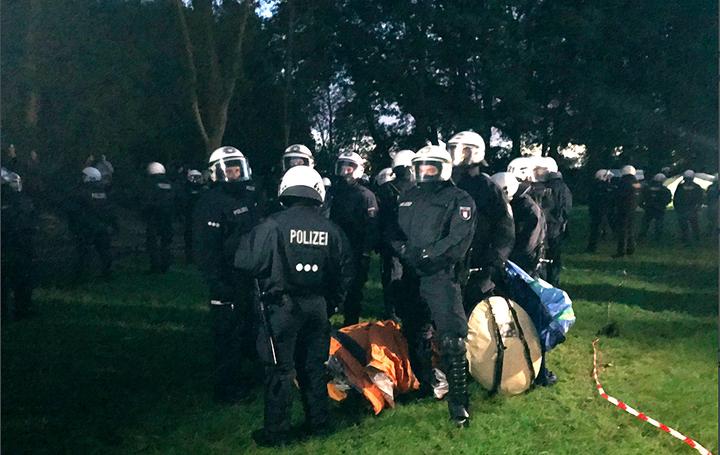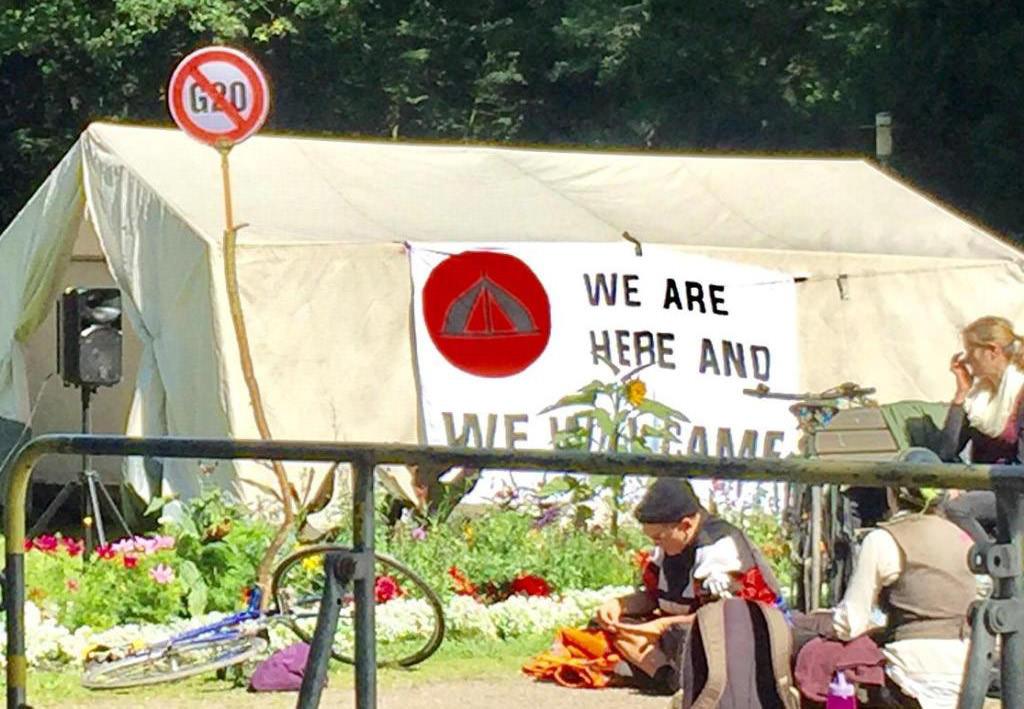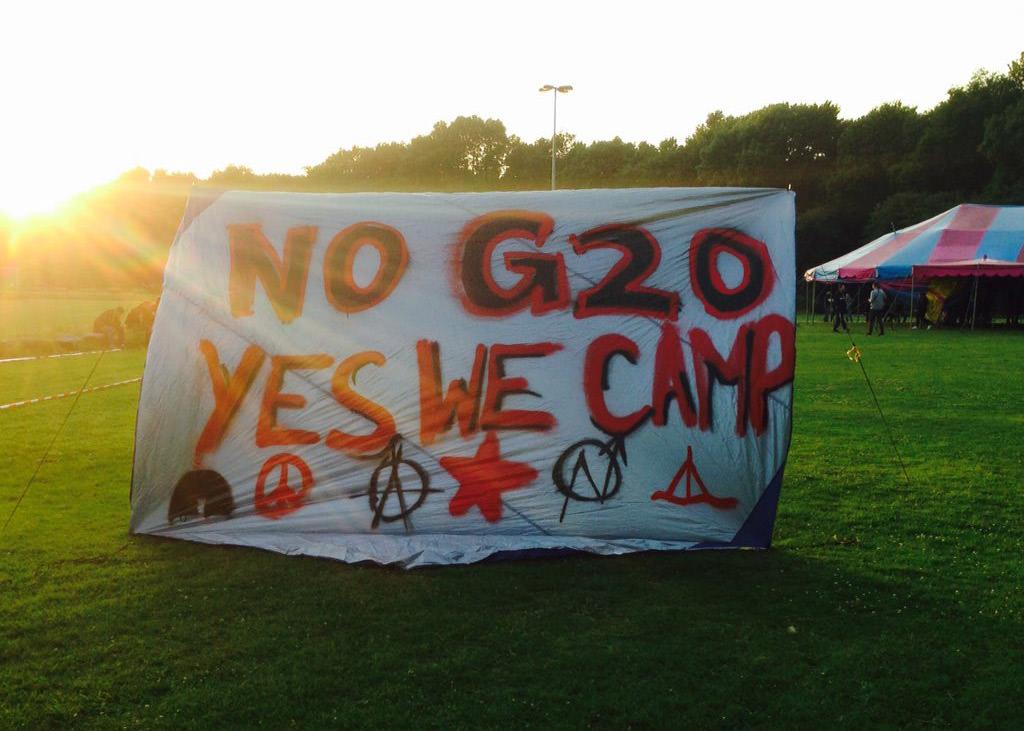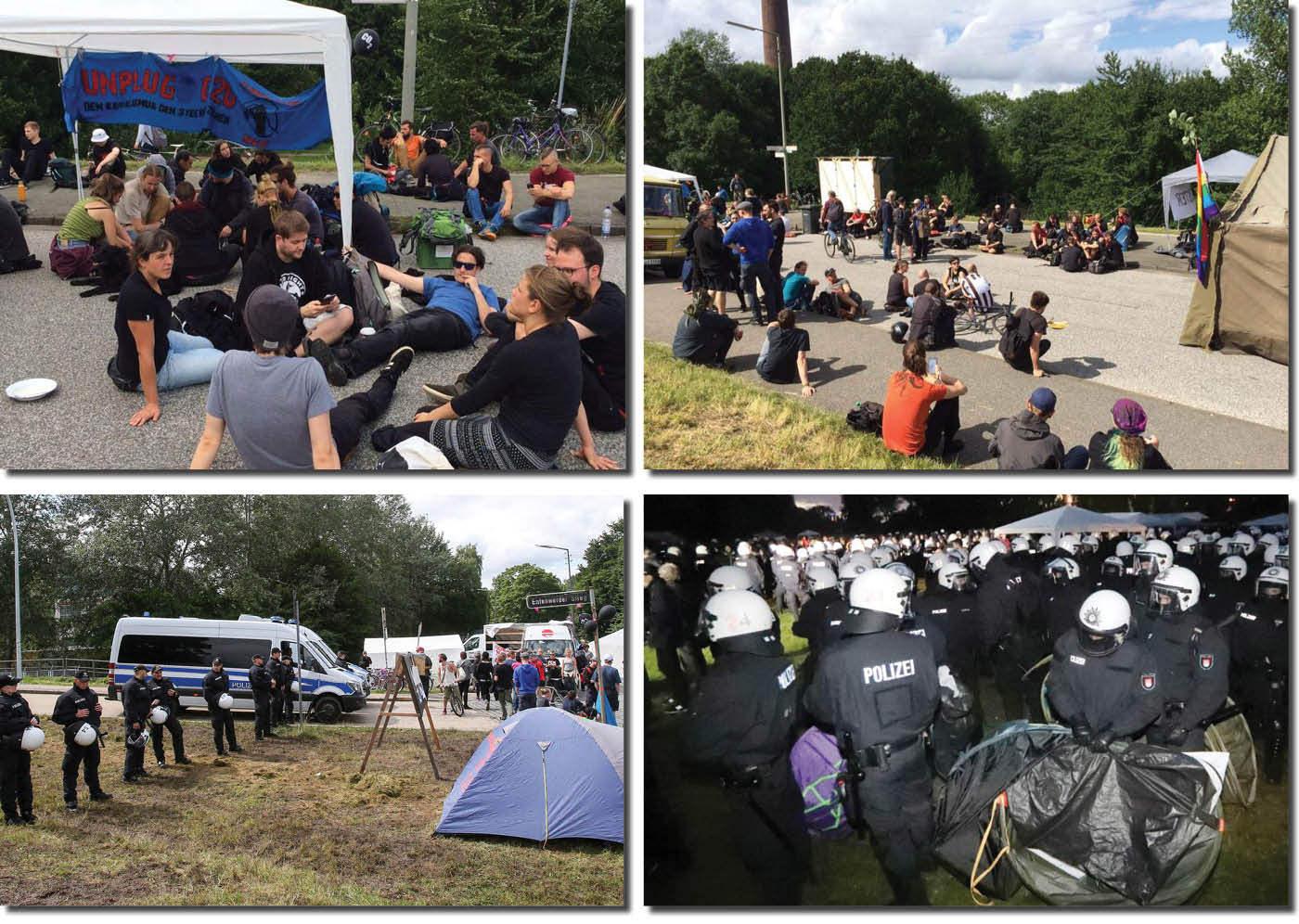En kan ju tycka att kamraterna bör ha lärt sig efter erfarnheterna i Göteborg att man inte ska samla alla kamrater på ett ställe för att bo.


The week of demonstrations against the G20 summit in Hamburg got off to a telling start on Sunday. A lengthy court battle culminated with the highest court in Germany upholding the right of the anticapitalist camp to set up in Hamburg. Yet when they attempted to do so, the police blocked access to the park, directly violating the court ruling, then carried out a brutal raid in which several hundred riot police surrounded and brutalized campers and confiscated their belongings. The following firsthand account illustrates the world that the G20 summit in Hamburg represents—a world in which “peaceful protest” and court proceedings exist only to distract the naïve, while the whims of security forces are the law of the land. No wonder people are preparing to resist the G20.
The passive demonstration that nonprofit groups organized for Sunday was explicitly not directed at the G20 rulers but only at their policies—as if mere sign-holding could possibly have any influence on state policy. The real demonstrations are scheduled to take place later this week during the summit itself.
The original group that had formed to organize a campsite for protesters during the G20 summit had split along similar lines, with the group that was afraid of anything that smacked of “violence” or opposition to capitalism accepting a purely symbolic site far away from central Hamburg, while the other group continued to push for a place in Hamburg proper. The latter group had apparently won, with Germany’s highest court ruling in their favor.
We arrive at Enterwerder Park in late afternoon. Hundreds of hopeful campers are gathered at the gates of the park, kept out by lines of police in heavy riot gear. The police have filled the area with armored vans, blocking the roads, stopping and immobilizing vehicles belonging to prospective campers and anyone else they consider suspicious. The campers have set up a temporary gathering at the gates, serving delicious goulash to whoever wants it and conferring about what to do. There is considerable outrage about the police defying the orders that the court gave to let us into the park, but no one has any particular idea what to do. Despite police rhetoric about “violence” and “rioters,” none of us came prepared for a confrontation.
There’s no point in trying to discuss it with the officers themselves. Their expressions are blank: their vacant eyes look through us as if we are not there at all. Recruiting advertisements on the armored vans depict hip young Germans with androgynous haircuts, their fresh faces strangely cruel and disinterested. I catch my comrades’ attention: “BEFORE,” I suggest, pointing to the fresh faces on the posters; “AFTER,” I conclude, pointing to a grizzled senior officer whose haunted visage illustrates the impact of a lifetime of obeying orders.
The police keep clamping down, establishing new control points along the road to the gate. They set up blockades multiple lines deep to prevent anyone from carrying more food to the aspiring campers at the gate—apparently someone was throwing apples over their heads so the campers wouldn’t go hungry. Fucking terrorists!
One local confides to me that although police will be present this week from all over Germany, these are the local Hamburg police. She knows them personally from attending demonstrations here—one of them broke her jaw, then made a point of beating her again at a subsequent demonstration.
We fan out into the area to look for other delivery routes to the assembly around the gate. In fact, there are several ways the police haven’t noticed. Rather than concentrating on the places they are blocking or sitting around apathetically, we should be looking for the margins, the edges beyond their awareness. They can never control everything completely.
However, when we finally return to the front of the park, the police have stood down. The officers who are standing to the side of the gates in small groups look somewhat sheepish as campers walk joyously past them. Has the chief of police relented, agreeing to abide by the court decision after all? We applaud as one of the trucks loaded with supplies passes through the gate. The drivers had been waiting for several hours, surrounded by lines of riot police.
Cheerful campers who have already set up large tents pick them up together, a person at each pole, so the tents themselves stroll across the threshold of the gate and into the park. This is the genial, animated world we hope to build.


Walking into the park, we pass dozens more armored vans and several more full squadrons of riot police in formation. It is beginning to dawn on us just how many of them are concentrated here. Groups of them surround the field in the park that will serve as our campsite. Nonetheless, the mood is festive as people set up the area. The practical-minded German protesters have prepared quite a bit of construction material. We eat and talk and compare notes together, speculating about what the week will bring.
As night begins to fall, groups of police withdraw from the field to the single road leading to the gate through which we entered. Are they leaving, finally? Will the campers finally be able to relax and get a little rest?
No—they’re not leaving. They’re massing at the end of the field, on the path leading to the gate.
Some of us go over to take a look. There are hundreds of them now, identical in their armor, line after line after line. Guns and batons and pepper spray hang at their sides. Each is dressed head to toe in thousands of euros worth of state-of-the-art protective gear, paid for by dutiful taxpayers who are not particularly curious about what Deutschland is doing with all their hard-earned income. The officers in the back have already put on their helmets.
They pull an armored van with a public address system on it to the front of their lines. People with medical conditions or histories of personal trauma are panicking as they try to figure out how to leave the park. The rest of us move towards the front. No one is eager to get arrested so early in the week, but we know that if we show any fear now, the police will be emboldened to bully and attack demonstrators all week long. We are not choosing whether to defend a campsite—we’re choosing whether to defend our capacity to demonstrate at all. If we don’t accept the gauntlet they’re throwing down, we will give away our freedom.
An announcement comes screeching through the speakers atop the police van: a man with a high-pitched, nasal voice is threatening us. People whistle and shout back at him. A camper makes a counter-announcement from the truck with the sound system in it and people cheer.
The police make a second announcement. The tension is thick in the darkening gloom: are we all going to jail? To the hospital? Then they make a third announcement, and the stormtroopers come marching in. We hear the sickening thud of their boots treading the ground in unison.
We mass around the sound truck and the tents, forming lines of our own. The police march around us, encircling us, and then they close in. They reach the sound truck, physically attacking the people around it. The chaos is disorienting—the shouting, the sound of people being beaten and pepper sprayed around us.
There is a person in the back of the sound truck where the sound system is. One officer sprays him full in the face with pepper spray, then the police grab him, pull him out of the truck, and throw him to the ground. Several officers crowd around him, kicking him over and over with their heavy boots. They kick him in the ribs, in the knees, in the neck, in the head. They do this calmly, robotically, and then they leave him on the ground, blinded, gasping, and contorted in pain.
They do not make any move to arrest him. Like the rest of the campers, he has not committed any crime.
Medics rush those of the injured who have managed to escape out of the police cordon. Ambulances pull up, anticipating serious or permanent injuries. Police wave around cameras on poles equipped with blinding searchlights. “Why are you filming?” shouts one camper.
“We’re not filming,” answers the officer flourishing the camera.
An eternity and a half hour later, the police march back in formation, half a dozen tents in their possession. All this to terrorize demonstrators, to show that brute force alone is all that counts in Hamburg.
“There will be no curiosity, no enjoyment of the process of life. All competing pleasures will be destroyed. But always there will be the intoxication of power, constantly increasing and constantly growing subtler. Always, at every moment, there will be the thrill of victory, the sensation of trampling on an enemy who is helpless. If you want a picture of the future, imagine a boot stamping on a human face—forever.” – George Orwell, 1984
The police seek to realize a vision of hell on earth. In the cosmology they represent, all humanity is suspect, guilty of potential insubordination, and only the constant threat of violence can keep us in line. Free will is a liability in a world in which the only conceivable purpose is to follow orders in return for a paycheck, so that everyone can be controlled and punished. Police are the murderers of freedom.
The worst thing about police is that they seek to strip us of the ability to imagine anything other than the reality they represent and impose. That is why it is worth it to them to spend millions of euros on an operation to seize a handful of tents. When they attack us—when they beat us with fists or batons, when they pepper-spray us, tear-gas us, or Taser us, when they shoot at us with concussion grenades, rubber bullets, marker rounds, or live ammunition—the real target of their assault is not our bodies, but our faith in humanity. They seek to bludgeon out of us any hope that human beings could relate on equal terms, leaving only the ugly equation of authority, obedience, and violence. They represent the very worst our species is capable of—pure mercenary indifference—and they hope to make this exception into the norm.
This is not surprising. Their lies about “human nature” offer the only narrative that could possibly excuse their conduct. For our part, we know that human nature, if there is such a thing, is broad enough to include many possibilities, many different ways of being and relating.
The masters of these police—the leaders of the G20, who will be meeting in Hamburg this week—represent a political class that no longer has any idea how to respond to the problems of our time except with greater and greater exertions of coercive force. There is no longer any pretense that we are moving towards a free and beautiful future, but rather a climate-change catastrophe torn by civil wars, divided between dictatorships and increasingly flimsy pretenses of democracy. This is why the G20 leaders are increasingly reliant on the police forces, to the extent of letting them dictate state policy in defiance of court orders. Without the representatives of brute force on their side, the ruling class is sunk, and they know it.
In this sense, the police state has already arrived.
When Donald Trump explicitly endorses violence against journalists and other Republican politicians carry it out, it is clear enough that the gloves have come off. In nations that still pride themselves on being democratic, such politicians—and their apologists, some of whom pose as their adversaries—will attempt to convince protesters that the only way to be “democratic” themselves is to obey the laws and passively accept whatever impositions the police make, while the authorities themselves hasten towards the rule of pure force. If they succeed in convincing us to be passive, the future will assuredly be unmitigated tyranny.
Make no mistake: if there are clashes in Hamburg this week, if anyone sees fit to defend herself or himself from the tens of thousands of police officers that have assembled here to brutalize all who will not slavishly consent to their rule, the fault lies with the so-called forces of order. They started it with their unprovoked attack on the camp at Enterwerder Park, they started it by treating Hamburg as a training ground to practice mass police brutality, they started it by training and assembling all these thugs in the first place.
The demonstrators against the G20 are fighting for their lives. They are fighting for all of our lives, for the world that we all share together—and they are fighting out of the kindness of their hearts. On the other side of the lines, we see the police abdicating responsibility for their actions in return for thirty pieces of silver. Anything anyone can do to resist them, to disrupt their strategies for world domination and carve out spaces of freedom, is loyalty to what is best in humanity.
Yet the transformations we seek will not be won simply in symmetrical clashes with police and fascists. Above all, we have to make it possible to believe in what is freest and most beautiful in our species, even as the authorities strive to conceal it. We have to make our dreams contagious, so that one day the police will find themselves surrounded and isolated, the last ones who still subscribe to their hideous program. We have to make spaces of joy and healing in which they, too, might one day shed their shameful skins and become something beautiful and free.

The park was a trap. The police did not let us in because the court had ruled that we had a right to be there, but only so that they could surround, contain, and brutalize us.
Perhaps we should have stayed outside the police lines. When a huge number of police are available to the state, as during this G20 summit, it doesn’t pay to let them surround us. It’s better to remain at the margins of their zones of control, always forcing them to expand further, spreading their resources thinner and creating situations in which they can’t help but antagonize the general population. At the edge of their range of control, our smaller numbers are not a problem—on the contrary, they can make it harder to track us, harder to predict what we will do next. When the authorities have to keep controlling ever wider areas, their bulk and force become liabilities, burdening them and provoking the public, drawing additional demographics and variables into the conflict.
This strategy of spreading out their area of concentration worked during the 2009 G20 summit in Pittsburgh, when protesters set out to cross the city in the opposite direction from the walls of riot police surrounding the meetings. When the police realized what was going on and mobilized, attempting to establish control throughout large swathes of the city, they ended up turning the people of Pittsburgh against them, precipitating a series of new clashes in which business districts were demolished, the police lost legitimacy in the public eye, and many who had previously been outside the clashes were politicized.
If, rather than filing into the camp, we had remained at the edges, we might have accomplished some of the same things. At the least, we might have been able to draw the focus of the police away from assaulting the hapless campers. There was only a single entry point into the park for all those riot vans—had we blocked it, they surely would have been forced to shift their attention from the camp to the city around them, a hostile territory that wants no part of their summit and experiences them as an occupying force.
Perhaps these reflections can be of use over the coming days.
crimethinc
En kan ju tycka att kamraterna bör ha lärt sig efter erfarnheterna i Göteborg att man inte ska samla alla kamrater på ett ställe för att bo.
kommunist
Var tänkte du människor skulle bo annars? : )
X
Det är ju en väldigt bra fråga kamrat, man får hitta något bättre sätt än att omringa sig av snutar. Man behöver ju inte bygga upp Hvitfeldtska i skogen för att veta att snutarna kommer och plockar en.
Man kanske inte heller behöver vara alla på ett ställe eller ha det offentligt. Ska man över gränserna för att göra hus i helvete med snutar får man väl jobba lite mer "underground".
kommunist
Det finns ju ett par problem med det du säger. Det första är ju exemplet Hvitfeldska. I Tyskland så har de arrangerat events som är större än Göteborgskravallerna en gång varje år ungefär och att etablera liknande läger är ganska standard. Som vanligt är tyskarna mer erfarna och proffsiga än vad vi är.
Det andra är att det inte går att alla ska bo hemma hos någon eftersom alla sociala center och alla platser hemma hos folk är uppbokade sedan november. Det är helt enkelt så stort.
Det tredje är att vi har en politisk och legal rätt att ha tältläger. Det är värt att kämpa för.
X